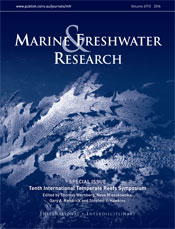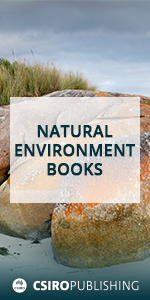
Marine and Freshwater Research
Volume 67 Number 1 2016
Tenth International Temperate Reefs Symposium
MF14413Looking backwards to look forwards: the role of natural history in temperate reef ecology
Temperate reefs are tractable experimental systems that have made a major contribution to general ecological and evolutionary biology. We celebrate this rich heritage firmly based in natural history. Knowledge of natural history us central to this contribution in terms of formulating appropriate questions, ensuring appropriate stratification of surveys and experiments. Natural history feeds into more modern modelling, macro-ecological and meta-analytical approaches where trait-based approaches are increasingly important. In the era of molecular bar-coding natural history is still needed to put a name to species enabling field identification. Thus going forward temperate reef ecologists most embrace new technologies and approaches whilst retaining classical skills to remain well-rounded ecologists.
MF14158The value of a broad temporal and spatial perspective in understanding dynamics of kelp forest ecosystems
Shallow temperate reefs are among the most productive ecosystems on Earth and they are threatened by numerous natural and human-induced pressures. We present four examples that demonstrate the value of a long-term broad-scale perspective in developing a predictive understanding of the complex ecology of giant kelp forests in southern California. Increasing the number of long-term ecological research programs in highly dynamic and valued ecosystems such as kelp forests is sure to pay great dividends towards improving our understanding of the causes and consequences of ecological change now and into the future.
MF14154How good are we at assessing the impact of ocean acidification in coastal systems? Limitations, omissions and strengths of commonly used experimental approaches with special emphasis on the neglected role of fluctuations
Much of the past research on ocean acidification suffers from too simple experimental design. We present weak spots of many common approaches with a strong emphasis on the disregard of natural fluctuations. Experiments up scaled along the suggested dimensions are likely to provide more realistic results.
MF14229Cusps and butterflies: multiple stable states in marine systems as catastrophes
The theory of alternative stable states is often used to explain rapid and difficult to reverse shifts between different community states that commonly occur in ecosystems. Here this idea is re-examined in terms of catastrophe theory, a theory that has been largely overlooked by ecologists. The well-known hallmarks of catastrophes can provide new experimental tests for alternative states in nature.
MF15232The 'Great Southern Reef': social, ecological and economic value of Australia's neglected kelp forests
Most Australians live near kelp forests, yet have little awareness of their value and significance. The ‘Great Southern Reef’ covers ~71 000 km2 along Australia’s temperate coastline. Its kelp forests boast unique marine life from at least nine phyla and it contributes at least AU$10 billion year–1 to Australia’s economy. The GSR is a significant natural asset that deserves recognition and investment.
MF15232 Abstract | MF15232 Full Text | MF15232PDF (690 KB) | MF15232Supplementary Material (353 KB) Open Access Article
MF14295Controlling inputs from the land to sea: limit-setting, cumulative impacts and ki uta ki tai
There are increasing impacts of land-based activities on coastal waters, especially from nutrients and sediments, yet little effective policy specifically accommodating land-sea connections. This paper discusses holistic approaches to management using examples from New Zealand, including limit-setting and recognising time lags from groundwater and cumulative effects. Worldwide, renewed effort is needed with a very long-term perspective to ensure effective solutions.
MF14155Climate-driven shifts in species' distributions may exacerbate the impacts of storm disturbances on North-east Atlantic kelp forests
Kelp forests are critical habitats in temperate seas, where they are often subjected to intense wave action. The winter storm season of 2013–14 in the North-east Atlantic was unusually severe, yet kelp forests in the south-west UK were high resilient to storm disturbance. However, a warm-water kelp appeared far more susceptible to storm damage than the dominant cold-water kelp, suggesting that climate-driven shifts in species abundances may erode the resilience of some kelp forests to physical disturbance.
MF14208Feeding habits of range-shifting herbivores: tropical surgeonfishes in a temperate environment
A significant impact of ocean warming is the poleward movement of species’ distribution, including the movement of tropical herbivorous fishes into temperate algal-dominated reefs. Using aquarium feeding assays, we show that juvenile tropical surgeonfish display higher feeding rates than their warm-temperate counterparts, particularly in warmer temperatures. This may cause increased herbivory pressure on temperate reef algae as ocean temperatures rise and tropical species become more common.
MF14255Limited effectiveness of divers to mitigate ‘barrens’ formation by culling sea urchins while fishing for abalone
Climate-driven incursion of the sea urchin Centrostephanus rodgersii into eastern Tasmania demands management intervention because of the urchins’ capacity to overgraze kelp beds and cause local collapse of fisheries. This work shows that divers culling urchins while fishing for abalone have no discernible effect on urchin numbers at the scale of dive sites although they may be effective in clearing urchins from small circumscribed patches, allowing recovery of seaweeds.
MF14266A test of metabolic and consumptive responses to local and global perturbations: enhanced resources stimulate herbivores to counter expansion of weedy species
Trophic compensation by herbivores negated the effect of local (nitrogen) and global pollution (CO2) on the expansion of algal turfs. This resource enrichment stimulated an increase in metabolic activity of herbivores so that the additional productivity of kelp competitors was consumed.
MF14211Transient effects of an invasive kelp on the community structure and primary productivity of an intertidal assemblage
The invasive kelp Undaria pinnatifida is one of the world's most successful invasive species and can become highly abundant in invaded ecosystems. We tested Undaria's effects on the structure and productivity of rocky intertidal assemblages in a long-term field experiment finding that Undaria had few overall effects on community composition, but doubled local primary production when it was abundant. This study highlights the importance of considering multiple ecological aspects of species' invasions when determining their impact and has broad relevance for invasion impact studies of Undaria and other canopy-forming macroalgae.
MF14318Spatial and temporal variation of kelp forests and associated macroalgal assemblages along the Portuguese coast
Distribution patterns of kelp communities were examined at three regions spanning a temperature and nutrient natural gradient along the Portuguese coast. Consistently through time, kelps were mostly found in the northern region, which separated from the central and the southern ones also in terms of associated assemblages. Kelp beds in southern Europe appear to be currently restricted to northern Portugal.
MF14244Drill-cored rock pools: an effective method of ecological enhancement on artificial structures
Coastal defences are proliferating in response to anticipated climate change and there is increasing need for ecologically sensitive design in their construction. In this study, drill-cored artificial rock pools enhanced the ecological condition of an intertidal breakwater and supported equivalent species richness to natural rock pools. These findings reveal the potential of drill-cored rock pools as an affordable and easily replicated means of enhancing biodiversity on a variety of coastal structures, both at the design stage and retrospectively.
MF14163Facing the future: the importance of substratum features for ecological engineering of artificial habitats in the rocky intertidal
Coastal defences are proliferating in response to climate change, leading to the creation of more vertical substrata. Diversity and abundance was higher on north-facing than on south-facing substrata. Grazing rates were greater on south-facing than north-facing substrata. These results highlight the importance of incorporating shaded habitats in the construction of artificial habitats.
MF14152A host-specific habitat former controls biodiversity across ecological transitions in a rocky intertidal facilitation cascade
Few studies have quantified facilitation cascades across ecological transition zones or where the secondary facilitator is an obligate epiphyte. We quantified diversity of mobile invertebrates associated with the seaweed Hormosira banksii and its obligate epiphyte Notheia anomala at different elevations, seasons, diurnal cycles, and following an epiphyte-removal experiment. All tests showed positive density-dependent effects of Notheia on invertebrates, with strongest facilitation at the transition from intertidal to subtidal habitats suggesting that epiphyte-driven facilitation cascades are common in marine benthic systems.
MF14198Unravelling the impact of harvesting pressure on canopy-forming macroalgae
The effects of canopy removal on macrobenthic communities from rocky shores were examined, taking into account the matrix associated to the harvested canopy-forming macroalgae. The greatest effects of harvesting were observed for the species that created a dominant monospecific canopy prior to the disturbance. The results demonstrate the importance of implementing ecosystem-based management, assessing both the habitats conditions and ecological roles of targeted commercial species.



